TODAY’S READING FROM THE OLD TESTAMENT- ISAIAH 19:1-21:17.
Chapter 19 introduces the 6th prophecy of the 11 judgments falling upon the nations. Isaiah addresses Egypt.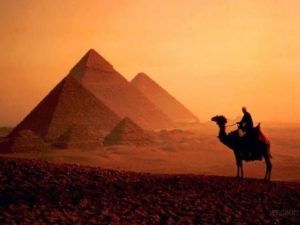
Egypt has often been featured in the Biblical narrative in its relationship to Israel. God’s people often turned to Egypt, rightly or wrongly, when they faced hardship. Because of a famine, Abraham went down to Egypt and got into trouble. Joseph was sold into slavery by his brothers and brought down to Egypt. Jacob’s sons went down to Egypt in a time of famine with their families. There through Divine Intervention that exalted their brother from his humiliation as a slave and prisoner to his exaltation as savior, they became a great nation. Under Moses they emerged from Egypt to settle in the Promised Land.
During Isaiah’s lifetime, Kings Ahaz and Hezekiah sought unholy alliances with Egypt to protect them from the threat of invasions from the north. Egypt proved to be an unreliable ally.
During the 400-year intertestamental period, Israel suffered at the hand of Egypt. When Jesus was born and Herod was threatening to kill all those in Bethlehem two years old and younger, God sent Jesus and his family to Egypt.
After Pentecost, the gospel spread throughout the Mediterranean world. Many converts were made in this part of North Africa, including such significant theologians as Athanasius, Origen and Augustine.
Although Egypt has a heavy Muslim presence today and Christians are persecuted, the church is strong there.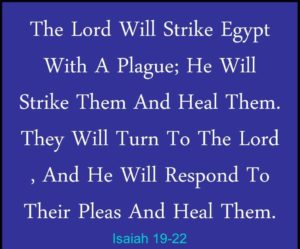
But the Word of God lays the sins of a nation bare. Idolatries are the primary target of God’s judgment. In the plagues that fell upon Egypt at the time of the first Passover, the false deities of Egypt were judged, including the sun, the River Nile, the frogs, gnats, and locusts.
Isaiah 19:1 1 The oracle concerning Egypt. Behold, the LORD is riding on a swift cloud and is about to come to Egypt; The idols of Egypt will tremble at His presence, And the heart of the Egyptians will melt within them.
The judgment will involve religious, social, industrial and commercial collapse.
There will be civil disunity, stirring Egyptian against Egyptian. The proud central government once ruled by Pharaohs would set up weaker self-governing city- states. The Lord promises to hand Egypt over to a cruel ruler, whose identity we cannot tell for sure, and natural disaster. The economy is heavily dependent upon the Nile River. When the river is judged, the surrounding land is no longer fertile for agriculture. There will be a failure of industry and commerce throughout Egypt.
Isaiah 19:7 7 The bulrushes by the Nile, by the edge of the Nile and all the sown fields by the Nile will become dry, be driven away, and be no more.
The fishing industry (19:8) and clothing industry (19:9) will be judged.
There will also be a political collapse (19:11-13).
God allows the confusion and distortion in their understanding.
Isaiah 19:14 14 The LORD has mixed within her a spirit of distortion; They have led Egypt astray in all that it does, As a drunken man staggers in his vomit.
However, healing is promised.
In verse 16, 18, 19, 23 we read the repeated phrase, “In that day”. Most scholars agree that this puts the prophesy in the context of the prophesied “day of the Lord”. The Jewish day starts at sundown. The first part of the day of the Lord is one in which darkness covers the earth in judgement. This is followed by the dawn when the Sun of Righteousness arises with healing in His wings- the kingdom of Christ (Malachi 4:2).
Verses 16-22 refer to judgment with the promise of salvation.
The fear of the Lord will come upon the people of Egypt.
Isaiah 19:21 21 Thus the LORD will make Himself known to Egypt, and the Egyptians will know the LORD in that day. They will even worship with sacrifice and offering, and will make a vow to the LORD and perform it.
The judgment will be followed by repentance and faith. And Egypt will have an exalted position in the kingdom.
Isaiah 19:25b 25 “Blessed is Egypt My people, and Assyria the work of My hands, and Israel My inheritance.”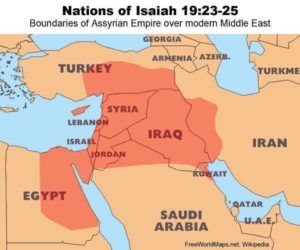
Cush (Ethiopia) has the dominant power in what was known as ‘the Ethiopian Dynasty”. It ruled Egypt from 715 BC. Cush and Egypt tried to stir the Palestinian states (Syria, Samaria and Judah) against the Assyrians. With the knowledge that this Ethiopian Dynasty had their back, some in Samaria, rebelled against Assyria.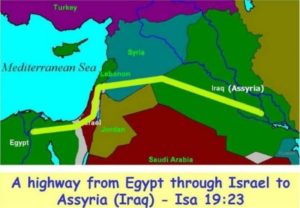
In Chapter 20 we read about Tartan, a general in the Assyrian army (2 Kings 18:17). He came to the city of Ashdod to deal with these rebels in 711 BC.
Isaiah was called to dramatically portray the weakness of Egypt and the folly of trusting in its promises of protection. Isaiah performed a mime, laying aside his outward tunic of mourning for three years. This was contrary to custom. Stripping himself of his sackcloth and taking off his sandals was equivalent to going naked in the minds of the people of his day.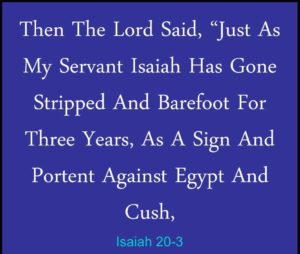
Isaiah 20:3 3 And the LORD said, “Even as My servant Isaiah has gone naked and barefoot three years as a sign and token against Egypt and Cush.”
Isaiah became a walking parable, as he no longer was adorned with customary clothes and shoes. By wearing stripped down attire, he was a warning of the future judgment coming upon Israel, Egypt and Cush.
Burdens 7, 8 and 9 are found in Chapter 21 against Babylon, Edom and Arabia.
Babylon is full of deceptive idolatry. God commands the Medo-Persians to destroy the city.
Isaiah 21:2 2 A harsh vision has been shown to me; The treacherous one still deals treacherously, and the destroyer still destroys. Go up, Elam (PERSIA) lay siege, Media; I have made an end of all the groaning she has caused.
This prophecy was given approximately 200 years before the invasion took place. While the Babylonian king Belshazzar is feasting, the Median general, Gobryas, detoured the water of the Euphrates River and drained the moat that protected the city to the degree that the Medo-Persian army could enter the otherwise impregnable Babylon by marching on the freshly dried river bed and entering through the empty underground water tunnels designed to bring water into the city through the walls and hidden beneath the river surface.
We find the expression found in Isaiah 21:9 in the Book of Revelation:
Isaiah 21:9 9 “Now behold, here comes a troop of riders, horsemen in pairs.” And one said, “Fallen, fallen is Babylon; And all the images of her gods are shattered on the ground.”
The image of harvest often refers to the final judgment, the separation of the wheat from the chaff.
Isaiah 21:10 10 O my threshed people, and my afflicted of the threshing floor! What I have heard from the LORD of hosts, The God of Israel, I make known to you.
In the harvesting of grain there were two different steps. First there was the threshing. This is when the heads of wheat were trampled to break open the seed pods where the valuable grain was stored. The seeds were then thrown into the air where the worthless chaff was blown away and the grain fell back on the floor. This is called winnowing. God is after the good grain, as the sinful, rebellious are sifted away.
THE BURDEN OF EDOM – DUMAH (Isaiah 21:11-12). The name means silence, and Seir means storms. They are pictured as Watchmen asking, “How much night is gone before the glory of God arises?”
THE BURDEN OF ARABIA (Isaiah 21:13-15)
It was evening in the history of Arabia. The coming judgment is one in which they will flee from those approaching with swords, bows, and ‘the grievousness of way.”
A timeline is given for this judgment: “Within one year” all the pomp of Kedar will come to an end.
TODAY’S READING FROM THE NEW TESTAMENT – GALATIANS 2:1-16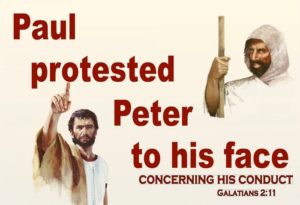
Paul continues his remarkable testimony. He is substantiating his claim that he is a genuine apostle with the genuine gospel. 14 years after meeting with Peter and James, Paul went up to Jerusalem with Barnabas and Titus. This was after the first missionary journey.
Paul reminds them that at the Jerusalem Council there was no obligation put upon them to circumcise Titus. (Circumcision was a sign of allegiance to the Old Covenant.)
Paul did not give in to the pressure of those of the opposition party of Judaizers, who were insisting that Gentiles conform to the ordinances of Judaism to be genuine Christians. 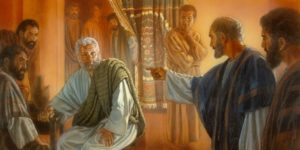
Paul unveils what was behind their self-righteous insistence on religious conformity:
Galatians 2:4 4 But it was because of the false brethren secretly brought in, who had sneaked in to spy out our liberty which we have in Christ Jesus, in order to bring us into bondage.
Paul exposes the bondage of legalism in this letter. God does not focus on externals. He wants to see truth established within and the power of the Spirit producing conformity to Christ without.
Paul has the conviction that he had the same authority as Peter, and was preaching the same message. Except Paul was preaching predominantly to the Gentiles and Peter to Jews.
The fact that the other apostles recognized Paul’s authority is illustrated by an incident of Peter showing duplicity when he came to Antioch. He had been preaching the equal standing of Jews and Gentiles before God, based on their both being justified by faith in Christ and His perfect work of redemption alone. Yet when the time came for the believers to have a meal together, Peter withdrew from the Gentiles because he did not want to offend the Judaizers with him (2:13).
Peter’s hypocrisy had a negative effect on the gathering. Even Barnabas and other Jews followed Peter’s poor example. (2:11-14). Paul publicly rebukes Peter. Peter in his epistles acknowledges Paul’s apostolic authority and the divine inspiration of his writings (2 Peter 3:15-16).
Paul gives his appeal to his fellow Jews, that neither Jews, nor Gentiles are justified before God by their works of conformity to the Law. We can only have a right standing before God through faith in Christ Jesus. The gospel is not about our performance, but Jesus perfect performance of righteousness on our behalf.
Galatians 2:15-16 15 “We are Jews by nature and not sinners from among the Gentiles; 16 nevertheless knowing that a man is not justified by the works of the Law but through faith in Christ Jesus, even we have believed in Christ Jesus, so that we may be justified by faith in Christ and not by the works of the Law; since by the works of the Law no flesh will be justified.
TODAY’S READING FROM THE BOOK OF PSALMS- PSALM 59:1-17
This is another prayer for deliverance from the attacks of the enemy. The Psalmist is suffering the mistreatment of bloodthirsty evildoers who give no thought for God. In the midst of his trials he demonstrates unshaken trust in the Lord. He prays that his enemies would be humiliated so all would recognize God’s sovereignty (Psalm 59:13).
There are two parts to this Psalm. Each section ends with a refrain praising God as his strength, fortress and stronghold.
Psalm 59:9 9 Because of his strength I will watch for You, For God is my stronghold.
Psalm 59:17 17 O my strength, I will sing praises to You; For God is my stronghold, the God who shows me lovingkindness.
TODAY’S READING FROM THE BOOK OF PROVERBS – PROVERBS 23:13-14
Proverbs 23:13-14 13 Do not hold back discipline from the child, although you strike him with the rod, he will not die. 14 You shall strike him with the rod and rescue his soul from Sheol.
This is not a recommendation for any abusive treatment of children. It is a reminder that to withhold discipline from children is another form of child abuse. Children need to recognize that there are consequences for disobedience and law-breaking. They also need patient instruction and training for doing what is right.
PRAY FOR THE NATIONS –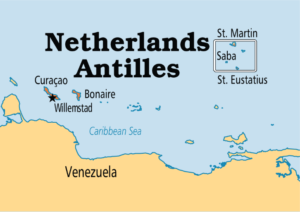
Netherlands Antilles
Caribbean
Geography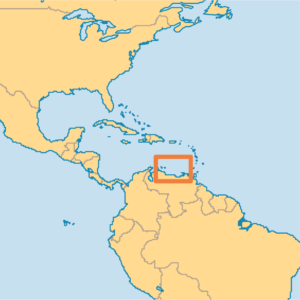
Area: 800 sq km
Two larger, barren islands, Curaçao and Bonaire off the coast of Venezuela, as well as three islands in the Leeward Islands 800 km to the northeast – St Eustatius, Saba and the Dutch half of St Martin (St Maarten). In 1986, Aruba withdrew from the Netherlands Antilles as an autonomous territory of the Netherlands.
Population: 200,726 Annual Growth: 1.49%
Capital: Willemstad
Urbanites: 93.2%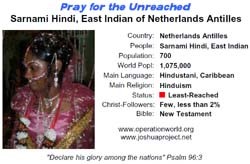
Peoples
Peoples: 15 (20% unreached) All peoples
Unreached Peoples Prayer Card
Official language: Dutch. Common languages Papiamento predominates, but use of English is widespread Languages: 7 All languages
Religion
Largest Religion: Christian
| Religion | Pop % | Ann Gr | |
| Christians | 183,825 | 91.58 | 1.2 |
| Evangelicals | 15,427 | 7.7 | 2.1 |
Challenges for Prayer
Evangelical witness progresses slowly but steadily. A vital, growing Church on every island is a target for prayer. Pentecostal/charismatic (often single-congregation denominations) and Baptist groups are the fastest growing and most outreach-oriented.
New Caledonia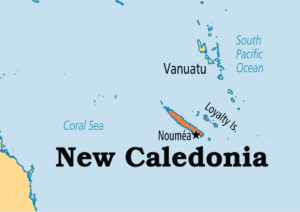
Pacific
Geography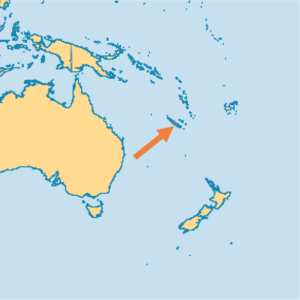
Area: 18,734 sq km
One large 400 km-long island, the Loyalty Islands, and other smaller coral islands 1,400 km northeast of Australia.
Population: 253,743 Annual Growth: 1.56%
Capital: Noumea
Urbanites: 57.4%
Peoples
Official language: French Languages: 41 All languages
Religion
Largest Religion: Christian
| Religion | Pop % | Ann Gr | |
| Christians | 204,644 | 80.65 | 1.5 |
| Evangelicals | 17,649 | 7.0 | 3.7 |
Challenges for Prayer
Less reached peoples:
- a) The 11,000 Muslims of Javanese or Arab descent retain their religion but not their languages. Little has been done to reach them.
- b )Polynesian Islanders have kept both their culture and their language. There are a few evangelical believers among the traditionally Catholic Wallisians and Futunans.
- c) The Caledoche live mostly in or near Nouméa. The AoG continue to work with them, but they are fairly closed to outside influence and few are evangelical believers.
- d )The Metropolitan French (bureaucrats or businesspeople) usually stay only a few years. Very few are involved with a church.
Bible translation is still a challenge as Melanesian languages are now used in the schools. There are five works in progress, and up to 20 other languages need further attention. Pray for the ongoing work and for the calling and equipping of new translation teams. Praise God for the completion of Bibles in Futunan and Wallisian and of the NT in Paici.
PRAYER: O Lord, we run to You, Our Strength, Our High Tower, Our Fortress. Deliver us from our enemies. Make known Your ways and draw penitent sinners to Yourself. We wait upon You, seeking to cooperate with the working of Your Spirit and giving heed to Your commands. We anticipate Your reigning upon the earth in righteousness. May people recognize Your sovereign mercies today and give us the grace to proclaim them. In Jesus’ Name. Amen.
